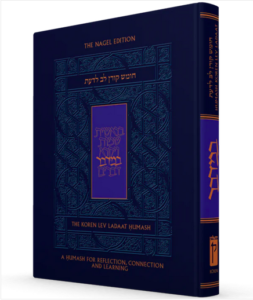By Rabbi Dr. Israel Drazin

BOCA RATON, Florida — “The Koren Lev Ladaat Humash – Bemidbar” is a superb Bible commentary that is very enlightening. It is filled with information. It prompts readers to think and better understand the Bible. It has clear easy-to-see Hebrew text with the highly acclaimed Koren font and the readable English translation by Rabbi Lord Jonathan Sacks.
It is filled with commentaries from many famed classical rabbis, rational and mystic, such as Rashi, Ramban, ibn Ezra, Yosef Bekhor Shor, Samuel Raphael Hirsch, Rashbam, Melekhet Mahashevet, Abarbanel, Malbim, Ralbag, Isaac Samuel Reggio, Yosef ibn Kaspi, Torat Ha’olah, Maimonides, Moshe Alshikh, Ho’il Moshe, and more. It also has a new commentary by Rabbi Shlomo Einhorn and Rabbi Dr. Zvi Grumet.
 There are also fascinating eye-and-mind-opening questions and Divrei Torah to encourage thinking and Shabbat discussions, essays at the end of most biblical portions called “exploring hashkafa” designed to challenge readers regarding the modern world and academic lessons.
There are also fascinating eye-and-mind-opening questions and Divrei Torah to encourage thinking and Shabbat discussions, essays at the end of most biblical portions called “exploring hashkafa” designed to challenge readers regarding the modern world and academic lessons.
Examples of thought-provoking questions from chapters 19 to 22, the weekly biblical portion of Chukat, are:
- Why does the Torah assign the function of the red cow to Aaron’s son Elazar and not Aaron?
- What does Moses speaking to the nation of Edom, descendants of Jacob’s brother Esau, teach us about dealing with someone when you have a history of an unpleasant encounter when you need to speak with them?
- Abraham ibn Ezra wrote that in chapter 20, all the desert events occurred either in the first or 40th year of the desert stay, but nothing about the intervening years. But other commentators disagree. Who is right? Will we ever know?
- If ibn Ezra is correct, why is nothing reported about the middle years?
- Rashi and other commentators note that immediately after relating the death of Miriam, the Torah states that the people did not have water. They conclude that the Israelites had water in the desert miraculously because of the merit of Moses’ sister Miriam. Is this what the Torah is saying?
- In 20:5, the Israelites complain that Moses failed to bring them to the land with grapes, figs, and pomegranates. Moses told them that God would take them to a land of milk and honey. Why are they talking about other items?
- Verse 20:12 has God severely punish Moses and Aaron after he gave water to the Israelites by hitting a rock, “Because you did not put your trust in Me to demonstrate My holiness in the Israelites’ eyes, you shall not bring this assembly into the land that I am giving them.” Many different ideas are advanced to explain what Moses and Aaron did wrong.
- Minha Belula states that Moses and Aaron sinned when instead of rebuking the complaining Israelites, they left the assembly to the Tent of Meeting. Why did the brothers act as they did?
- A popularly-held theory for the punishment is that Moses hit the rock rather than speaking to it. It would have been a clear miracle if he had spoken to the rock, and the rock responded by spouting water. It would show that God was helping the Israelites. But having water flow by hitting the stone will cause the people to think this was a natural event. The striking broke open a hole for the water to flow.
- Is it reasonable to think God punished the brothers because Moses hit the rock rather than speaking to it? Should we believe that God is so sensitive about His honor? Does God act like sensitive humans? Also, God told the brothers to bring the staff.
- Isn’t a more reasonable explanation for why Moses could not lead the Israelites into Canaan his age? His behavior during this episode showed that despite his heroic leadership in the past, he was no longer competent to lead the people. He was now too old to continue. It was now necessary to have a younger leader.
- There is also a full-page discussion in this Koren book on whether divine commands, mitzvot, make sense. This issue, like the others the book raises, will make us think. We might consider the following.
- A large segment of Jews is convinced, as Rashi is, that the explanation of many of the biblical commandments is unknowable. They call such a command a chok and cite the laws of the Red Heifer as the prime example.
- Rashi takes this view from the Babylonian Talmud Yoma 67 and comments on verse 19:2, “This is the chok of the Torah,” and writes, “Because Satan and the nations of the world taunt Israel, saying ‘What is this commandment and what is the reason for it,’ [scripture] calls it chok [a word implying delving deep, such as an inscribed law] that it is a decree to us, we have no right to think about it.”
- Rationalists such as Maimonides reject this opinion. They insist that everything in the Bible is reasonable. Maimonides explains the laws of the Red Heifer in his Guide 3:47.
- The Koren book prompts us to consider many ideas about this issue.
- Among much else, we are left to wonder, did the ancient rabbis believe that God gave commands to the Israelites that are inexplicable? Or, did the rabbis say they were baffling to make the average Jew they felt could not understand them to feel good, what Plato called “noble lies” and Maimonides “essential truths?”